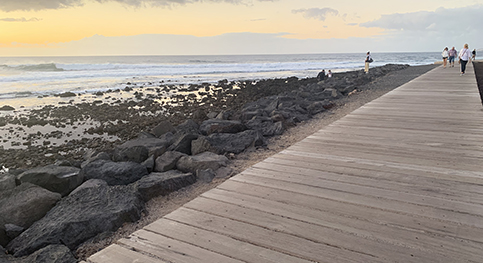The new term for home
rentals and holiday rentals
Development in the banana sector representative of the balance of the three powers
Leopoldo Cólogan

On 22 February 2019, Carlos Espinosa de los Monteros, former High Commissioner for the Spain Brand, reminded us that “the image is how the brand is perceived, not what it looks like”. He told us that in his environment the concepts associated with the Canary Islands in Europe, i.e. with its brand, include the following: “climate, far away, holidays, banana, flowers, yellow, beauty and ecology”.
He also reminded us, alongside Héctor Gómez, leading Canary politician and General Director of TURESPAÑA, that tourism is the most important industry in the Spanish economy, accounting for more than 11 per cent of GDP.
They made this statement at an event organised by APD Canarias at an emblematic venue, Gran Hotel Bahía del Duque, located in Adeje. Having celebrated its 25th anniversary, it has been and continues to be the flagship of quality tourism in the Canary Islands, especially in the south of Tenerife.
In this context, we must bear in mind that the changes taking place around us are disruptive, rapid changes based on algorithms in which disintermediation tends to prevail. Everything tends to be contracted directly, as José María Aznar, ex-President of the Government of Spain, highlighted during a conference on 31 January 2019 organised by Financial Adviser Jorge Hodgson to mark the company’s first anniversary, which was held in another renowned hotel in the south of Tenerife, Hotel Europe Villa Cortés.
What’s more, it may be the case that it is not humanity that intervenes in the new revolution, but rather artificial intelligence, despite the fact that the algorithms that made it possible were created by humans.
The reality is that we are surrounded by algorithms that, even if it may seem to be an abstract concept, are no more than the mathematical operations that surround us which serve to provide solutions to problems. Hence, it is important that more and more people in future generations master the art of mathematics and the management of big data in order to cope with future revolutions.
History has shown us that there has always been a rivalry between established power and emerging power. In the economic and social sphere we are referring to, it would be equivalent to competition between the existing tourism sector, the hotel sector, and the emerging sector of holiday tourism rentals, as well as the coexistence of the latter with housing rentals. In a constitutional context, it is referred to in Articles 9 and 47, in which conditions must be promoted as basic principles to facilitate people’s access to economic and social life as well as to decent and adequate housing.
Seeking to balance the aforementioned coexistence, whether rightly or wrongly, Act 29/1994 of 24 November on Urban Renting was recently reformed by means of the Royal Decree 7/2019 of 1 March on urgent measures for housing and renting, published in the Official Gazette of Spain on 5 March 2019. It stipulates that the new minimum period for housing rentals, in favour of and optional for the tenant, is five years and seven years in the case of a legal entity, that is, if the rent is collected by a company. There is also an additional extension of up to three years if no notice is given by the landlord or the tenant four or two months in advance of the aforementioned minimum period, respectively.
These terms are not imposed on rented dwellings of more than 300 square meters in total or with an initial annual rent that is more than 5.5 times one year of the minimum interprofessional salary.
"Renting homes for tourism activity is clear proof of disintermediation and the disruptive changes, which even call into question principles such as the principle of unity of exploitation in tourism activities."
The distinction between individuals and companies, and the rights and obligations they have in one case or another, may be logical at times, although I have doubts about the term. In any case, I believe it should be accompanied by greater equality in tax treatment, allowing individuals to generate the wealth that their effort, capacity and luck allows them, without imposing a greater tax burden on them.
The opposite is, at the very least, contradictory. It focuses on the creation of companies, sometimes unnecessarily, to then ask them who the real owners are. It is simpler to enable people to have their assets directly, complying with fair tax obligations, under equal conditions that are effectively and truly proportional to their real income, rather than fictitious or theoretical. Simple rules that are understandable to the average person ought to be applied, and at the same time, various tax burdens should be prevented in cases where, in practice, there is only one legal transaction with real economic benefit.
This is against a background where, as noted by the aforementioned Royal Decree 7/2019 of 1 March, in 2017 more than 42% of Spanish households spent more than 40% of their income on rent, and that the price of rent has increased by more than 15% in the last three years and, in some locations in tourist provinces, such as Las Palmas and Santa Cruz de Tenerife, as well as in Barcelona, Madrid, the Balearic Islands and Malaga, the increase is double that recorded in Spain as a whole.
It includes a technical clarification where it excludes the renting of dwellings for tourist use from the Urban Leasing Act, removing the restriction that these must be marketed through tourist offering channels and referring specifically to what is established in the tourist sector regulations that apply.
The above brings us to recall the judgement of the Supreme Court, Third Chamber for Contentious Administrative Proceedings, Section 3a, number 26/2019 of 15 January 2019, motion 3760/2017, which refers to the essential doctrine against certain restrictions set out in Decree 113/2015 of 22 May, which adopts the regulation regarding holiday homes of the Autonomous Community of the Canary Islands. This doctrine promotes the provision of holiday homes in tourist areas, room assignment and shared use.
Renting homes for tourism activity is clear proof of disintermediation and the disruptive changes, which even call into question principles such as the principle of unity of exploitation in tourism activities.
The aforementioned Royal Decree 7/2019 of 1 March also amends Act 49/1960 of 21 July regarding horizontal property, establishing that it is incumbent upon the Committee of Proprietors to reach an agreement limiting or conditioning the activity of renting out properties for tourist use, with the favourable vote of three fifths of the total which, in turn, represents three fifths of the participation quotas, including the possibility of increasing its contribution to common expenses up to 20%.
On the other hand, Act 8/2018 of 5 November, amending Act 19/1994 of 6 July, amending the Economic and Fiscal Regime of the Canary Islands, established that the reserve for investments in the Canary Islands, known as RIC, may not be used for the acquisition, refurbishment or renovation of properties intended for tourism purposes under any circumstances.
Ultimately, returning to one of the concepts that is associated with the brand of the Canary Islands, the “banana”, there was a development in the form of the judgement of the Superior Court of Justice of the Canary Islands in Las Palmas de Gran Canaria, Chamber for Contentious Administrative Proceedings, Section 1a, number 81/2019 of 11 February 2019, motion 510/2017, in which the court amended its criteria and returned to its initial doctrine. It retroactively applies the clarifying effects of legislature and takes into account the principles of legal certainty, legitimate confidence and the action taken by the Administration itself.
This clarification of legislature is consistent with that provided in the publication of the cited Act 8/2018 of 5 November, which clearly establishes that for the purposes of calculating the yields derived from the sale of tangible property produced in the Canary Islands, the banana subsidies will be part of the same, hence their inclusion for the purposes of the allowance.
In my opinion, the cited judgement is a good example of what the independence and balance of the three powers, the executive, the judiciary and legislature, represents: the essence of democracy.


